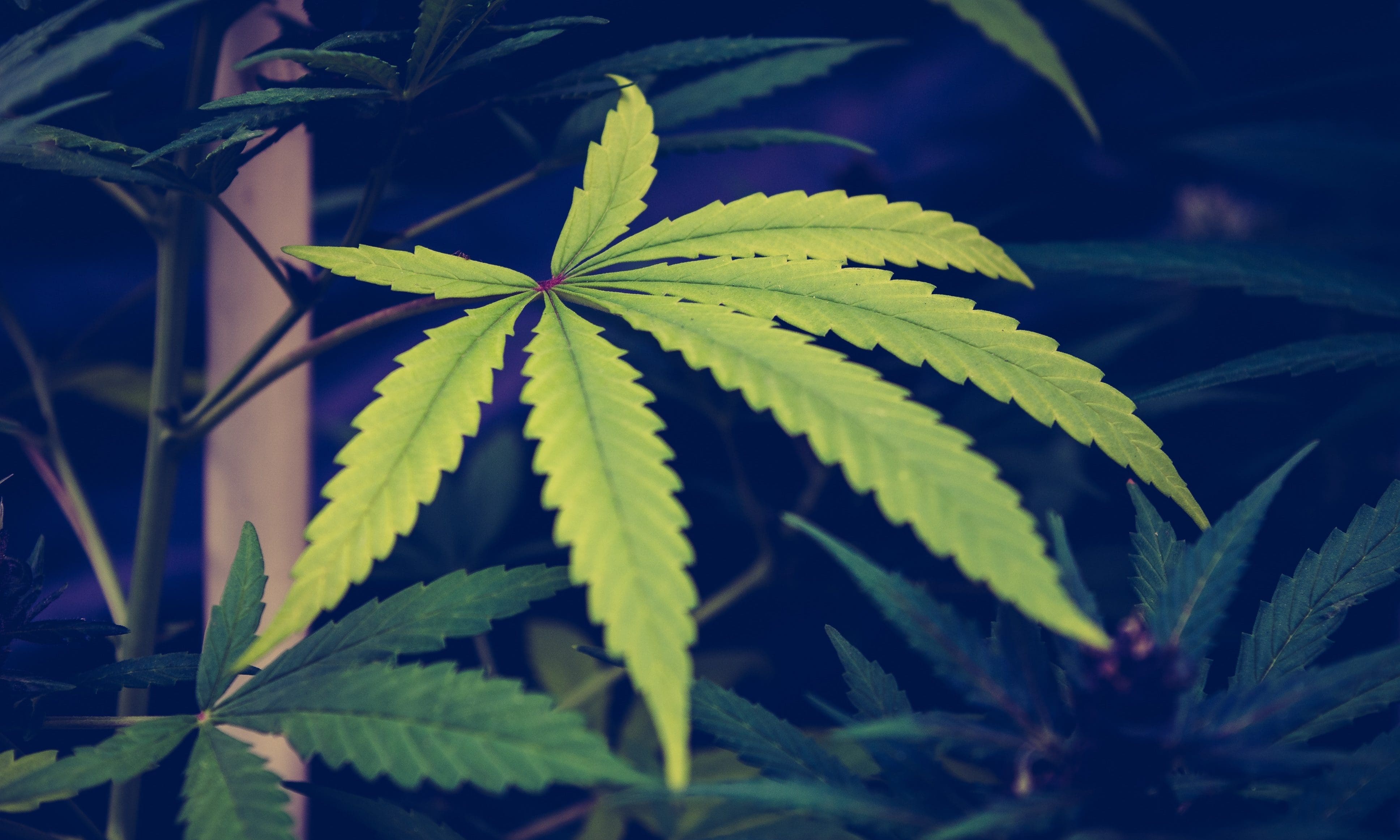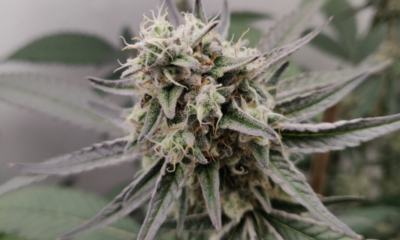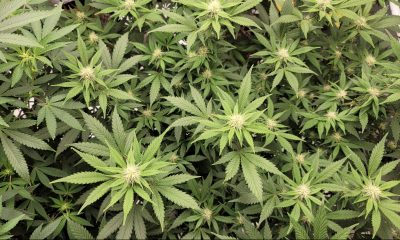Politics
Maryland Governor Lets Bill To Implement Marijuana Legalization Take Effect Without His Signature

Maryland’s Republican governor announced on Friday that he won’t stand in the way of implementing marijuana legalization if voters approve the reform on the November ballot.
Gov. Larry Hogan (R) included the cannabis legislation in a list of bills he is not signing or vetoing, but is allowing to take effect without his signature.
Last week, The Senate and House of Delegates approved separate measures to put a referendum before voters on whether the state should legalize marijuana and to begin implementing the reform if the ballot question is approved.
Both HB 1, the referendum measure, and HB 837, the implementation bill, were sponsored by Del. Luke Clippinger (D), who chairs the Judiciary Committee and led a legislative cannabis workgroup formed by House Speaker Adrienne Jones (D).
The former bill simply places legalization on the ballot and, because it is a constitutional amendment, is not subject to action by the governor.
HB 837, meanwhile, sets basic rules for the adult-use program if voters approve the ballot referendum. Those provisions mostly concern issues such as penalties and expungement. It is that bill that Hogan announced will take effect without his putting pen to paper.
Under the law that would be enacted if voters approve legalization at the ballot, the purchase and possession of up to 1.5 ounces of cannabis would be legal for adults. The legislation also would remove criminal penalties for possession of up to 2.5 ounces. Adults 21 and older would be allowed to grow up to two plants for personal use and gift cannabis without remuneration.
Past convictions for conduct made legal under the proposed law would be automatically expunged, and people currently serving time for such offenses would be eligible for resentencing. The legislation makes it so people with convictions for possession with intent to distribute could petition the courts for expungement three years after serving out their time.
The bill was also amended throughout the legislative process. For example, language was attached to create a community reinvestment fund and allow state tax deductions for certain cannabis-related expenses that marijuana businesses are barred from claiming under current federal tax code.
—
Marijuana Moment is already tracking more than 1,000 cannabis, psychedelics and drug policy bills in state legislatures and Congress this year. Patreon supporters pledging at least $25/month get access to our interactive maps, charts and hearing calendar so they don’t miss any developments.
![]()
Learn more about our marijuana bill tracker and become a supporter on Patreon to get access.
—
“Maryland is poised to replace the disastrous policy of prohibition with equitable legalization,” Karen O’Keefe, state policies director for the Marijuana Policy Project, told Marijuana Moment. “The legislature has put in place important provisions to legalize possession and home cultivation, to expunge some records and release some cannabis prisoners and to lay groundwork to foster ensure an equitable industry with community repair and reinvestment.”
A separate bill, SB 833 from Sen. Brian Feldman (D), as originally introduced would have created specific regulations for the industry—touching on tax policy, licensing and more—that would also have been contingent on voter approval of the referendum question.
But while some senators pushed for the more prescriptive legislation, arguing that voters should know more about what kind of market would emerge before heading to the polls in November, Feldman’s bill was largely replaced with the language of HB 837. As such, lawmakers will return to the question of commercial cannabis regulations next year if voters approve the referendum.
The approved legislation would further establish a Cannabis Business Assistance Fund to support equity initiatives for minority- and women-owned businesses. That fund would go toward incubator and educational programs to promote participation in the industry by people most impacted by criminalization.
To understand the effects of legalization on the state and its residents, the statutory bill would also establish various research initiatives, including studies into youth impacts, use patterns, impaired driving, advertising, labeling, quality control of products and barriers to entering the industry. A baseline study would be conducted before legalization, and updates would be sent to the governor every two months.
If voters approve legalization in November, it wouldn’t take effect immediately. Possession of small amounts of cannabis would become a civil offense on January 1, 2023, punishable by a $100 fine for up to 1.5 ounces, or $250 for more than 1.5 ounces and up to 2.5 ounces. Legalization for up to 1.5 ounces wouldn’t kick in for another six months.
Advocates have taken issue with that protracted timeline. Having possession legalization take effect sooner was among several asks they made that were not incorporated into the now-passed legislation. For example, activists also wanted lawmakers to include a provision preventing police from using the odor of marijuana alone as the basis for a search.
Another potential problem that advocates have identified is the proposed allocation of equity funds. The bill would provide certain funding for jurisdictions with the most cannabis arrests; and while black people are more likely to face criminalization over cannabis on average, some of the counties in Maryland where marijuana arrests have been most common are mostly white, potentially undermining the intent of the reform provision.
As noted, certain senators, including Senate President Bill Ferguson (D), have expressed skepticism about punting the creation of regulations for the marijuana market until next year. However, last month, Ferguson signaled openness to the referendum idea—but stressed that voters deserve to know more details of what a legal cannabis market would look like than is provided in the House bills.
That was a notable shift considering that the top senator said last year that he favored legalizing cannabis through the legislature rather than waiting to ask voters on November’s ballot.
Another legalization bill filed by Sen. Jill Carter (D) last month was considered in committee in February, but did not advance.
Meanwhile, a separate competing legalization bill on the House side, HB 1342, was introduced in February by Del. Gabriel Acevero (D). It had a brief committee hearing last month but never received a vote.
Maryland lawmakers are also considering separate legislation this year to decriminalize drug possession and fund access to psychedelics for therapeutic uses.
When it comes to marijuana, legalization began to advance through Maryland’s legislature last session, but no votes were ultimately held. The Senate Finance Committee held a hearing last March on a legalization bill sponsored by Feldman and Ferguson. That followed a House Judiciary Committee hearing on a separate cannabis proposal in February.
Lawmakers then worked to reconcile the differences between the House and Senate proposals in hopes of getting something to the governor’s desk. Hogan has not endorsed legalization but has signaled he may be open to considering the idea.
A poll in October found that the state’s residents are on board with the policy change. Two-thirds (67 percent) of Marylanders now back legalizing cannabis, according to a Goucher College survey. Just 28 percent are opposed.
Maryland legalized medical marijuana through an act of the legislature in 2012. Two years later, a decriminalization law took effect that replaced criminal penalties for possession of less than 10 grams with a civil fine of $100 to $500. Since then, however, a number of efforts to further marijuana reform have fallen short.
A bill to expand the decriminalization possession threshold to an ounce passed the House in 2020 but was never taken up in the Senate.
Also that year, the governor vetoed a bill that would have shielded people with low-level cannabis convictions from having their records publicized on a state database. In a veto statement, he said it was because lawmakers failed to pass a separate, non-cannabis measure aimed at addressing violent crime.
In 2017, Hogan declined to respond to a question about whether voters should be able to decide the issue, but by mid-2018 he had signed a bill to expand the state’s medical marijuana system and said full legalization was worth considering: “At this point, I think it’s worth taking a look at,” he said at the time.
As for Maryland lawmakers, a House committee in 2019 held hearings on two bills that would have legalized marijuana. While those proposals didn’t pass, they encouraged many hesitant lawmakers to begin seriously considering the change.
















